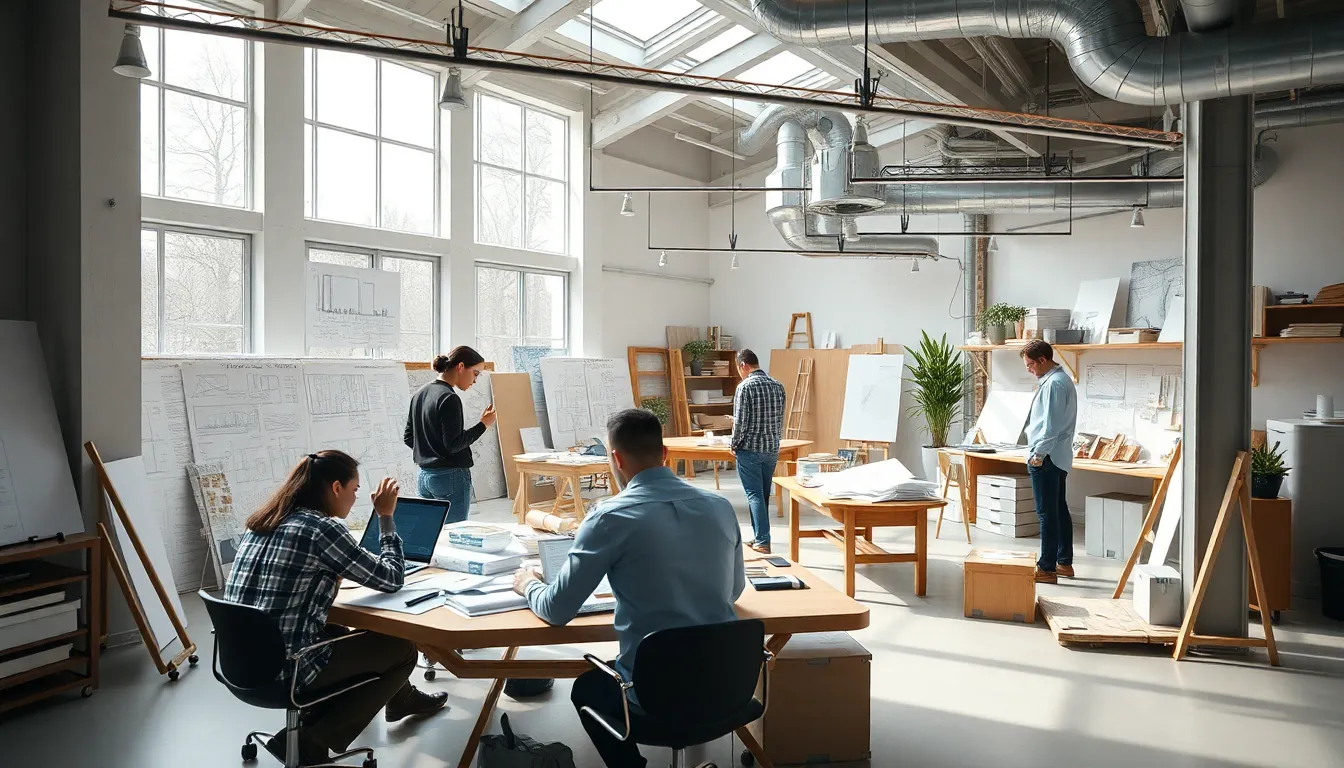Architecture and interior design aren’t just about pretty pictures and fancy furniture. They’re the magic that transforms ordinary spaces into extraordinary experiences. Whether you’re daydreaming about your future home or contemplating a career in the field, understanding the nuances of architecture and interior design is essential.
Imagine walking into a room that feels just right, where every element works in harmony. That’s the power of good design. From the basics of spatial awareness to the intricate dance of color palettes, there’s a lot to unpack. So buckle up and prepare to dive into the fascinating world of architecture and interior design—where creativity meets functionality, and every corner tells a story.
Overview of Architecture Kdainteriorment
Architecture Kdainteriorment combines architectural design with interior elements, creating cohesive environments that enhance living and working spaces. This discipline prioritizes spatial flow, ensuring that each area blends functionality with creative expression. Understanding the relationship between architectural frameworks and interior aesthetics contributes to creating harmonious settings.
Design principles play a crucial role in Kdainteriorment. Concepts such as balance, proportion, and harmony ensure that both interior elements and exterior forms complement each other. Effective color schemes enhance mood, influencing how spaces feel and function. The strategic use of light, both natural and artificial, further elevates these environments, revealing textures and enhancing visual appeal.
Materials are equally important in this field. Selecting materials affects durability and aesthetic appeal, contributing to the overall vision. Sustainable practices in material selection are gaining traction, reflecting a growing awareness of environmental impact. Innovative technologies also play a pivotal role, enabling smart designs that promote energy efficiency.
Collaboration is essential in Kdainteriorment. Architects, interior designers, and clients often work together to achieve a unified vision. Engaging in open dialogue helps clarify needs, preferences, and functional requirements, ensuring a successful outcome. Various influences, such as cultural contexts and current trends, shape each project, making adaptability vital.
Learning about Kdainteriorment involves appreciating how architecture interacts with interior design. Gaining insights into this relationship fosters an understanding of how spaces impact interactions and experiences. A well-designed environment not only meets practical needs but also inspires creativity and well-being.
Key Concepts to Understand

Understanding key concepts in architecture Kdainteriorment is essential for creating functional and aesthetically pleasing spaces. This section highlights important principles that shape thoughtful design.
Design Principles
Design principles form the backbone of effective architecture Kdainteriorment. Balance ensures that visual weight is evenly distributed across a space. Proportion refers to the relationship between elements, contributing to harmony. Harmony creates cohesion in colors, materials, and shapes. Emphasis draws attention to focal points, while rhythm guides movement throughout a design. Each of these principles interacts to enhance the overall experience and creates environments that resonate with users.
Space Planning
Space planning involves strategically organizing elements within a space to optimize functionality. Effective layouts consider traffic flow, maximizing accessibility and usability. Function zones must be defined, separating areas for work, relaxation, and social interaction. Attention to scale and relationships between furnishings prevents overcrowding and promotes comfort. Thoughtful space planning fosters environments that support daily activities while reinforcing the overall design concept.
Materials and Finishes
Choosing the right materials and finishes plays a critical role in Architecture Kdainteriorment. This aspect shapes aesthetics, durability, and sustainability of environments.
Sustainable Options
Sustainable materials significantly impact both design and the environment. Bamboo offers rapid renewability with its sturdy composition. Recycled steel provides strength while minimizing waste. Low-VOC paints reduce indoor air pollution, promoting healthier living spaces. Resilient choices like reclaimed wood add character while supporting eco-friendly practices. Opting for sustainable flooring, such as cork or linoleum, enhances comfort and reduces environmental footprints. Emphasizing these materials contributes to a cohesive design strategy that respects nature and fosters well-being.
Aesthetic Choices
Aesthetic choices define the visual identity of spaces within Architecture Kdainteriorment. Natural stone exudes elegance and timeless appeal, providing an organic touch. Matte finishes convey contemporary sophistication, while glossy surfaces evoke modern flair. Textured wallpapers add depth and personality to walls. Earthy color palettes create calming environments that enhance relaxation. Contrasting materials, like wood against metal, establish visual interest and encourage creativity. These careful selections help create harmonious atmospheres that delight occupants and provoke engagement.
Tools and Technology
Architecture Kdainteriorment leverages various tools and technologies to elevate design practices. Understanding these instruments streamlines the creation of functional and beautiful spaces.
Software for Design
Design software plays a crucial role in the field of Architecture Kdainteriorment. Programs like AutoCAD enable precise drafting and contribute to layout planning. SketchUp allows for 3D modeling, helping designers visualize concepts. Revit facilitates Building Information Modeling, promoting collaboration among stakeholders. Each software provides unique advantages, ensuring designers can meet specific project needs efficiently. Familiarity with multiple platforms enhances versatility and adaptability in design projects.
Virtual Reality in Architecture
Virtual reality technology transforms how architects and interior designers engage with clients. VR offers immersive experiences, allowing users to walk through their designs before construction begins. This approach supports better decision-making and clearer communication, as stakeholders can experience spatial dimensions firsthand. Additionally, virtual reality fosters an understanding of lighting and material effects in real-time. Implementing VR enhances client satisfaction and streamlines feedback, ultimately resulting in optimized design solutions.
Career Opportunities in Architecture Kdainteriorment
Career paths in Architecture Kdainteriorment present diverse and fulfilling options. Architects focusing on Kdainteriorment may work on residential, commercial, or institutional projects. Each project type requires a unique approach to integrating interior and exterior design elements.
Interior designers specializing in this field often emphasize spatial harmony. Their tasks include selecting furnishings, colors, and layouts that enhance the overall experience of a space. Collaboration with architects is essential to ensure concepts align seamlessly.
Project managers play a crucial role in directing Kdainteriorment projects. These professionals oversee timelines, resources, and communication between teams. Effectively managing such projects promotes successful outcomes and client satisfaction.
Sustainability consultants also find opportunities within Architecture Kdainteriorment. They focus on using eco-friendly materials and strategies while ensuring compliance with local regulations. Their expertise supports the growing demand for sustainable designs.
Furniture designers contribute by creating tailored solutions that complement architectural concepts. Custom furniture adds uniqueness and functionality to spaces, elevating the overall design experience. This role often involves collaborating closely with interior designers to achieve cohesive outcomes.
Landscapers offer valuable insights into exterior spaces. Their work ensures that outdoor environments complement and enhance the interiors, providing a holistic approach to design. This coordination supports a seamless transition between indoor and outdoor areas.
Educational institutions increasingly offer programs in Architecture Kdainteriorment. Graduates benefit from skills that meet the evolving needs of the industry. Continuing education plays a vital role in keeping professionals updated on emerging trends and technologies.
Career opportunities in this evolving field promise growth and innovation. Individuals passionate about blending architecture and interior design can find numerous paths to pursue their interests.
Conclusion
Architecture Kdainteriorment offers a unique approach to designing spaces that harmonize both form and function. By understanding the principles of balance, proportion, and sustainability, designers can create environments that not only look stunning but also enhance the quality of life for their occupants.
The integration of advanced tools and technologies further enriches this field, allowing for innovative practices that cater to modern needs. As the industry evolves, the importance of collaboration among various professionals becomes increasingly clear.
Embracing this multidisciplinary approach will lead to the development of spaces that inspire creativity and foster well-being. Exploring Architecture Kdainteriorment opens doors to a fulfilling career path that shapes the way people experience their environments.







